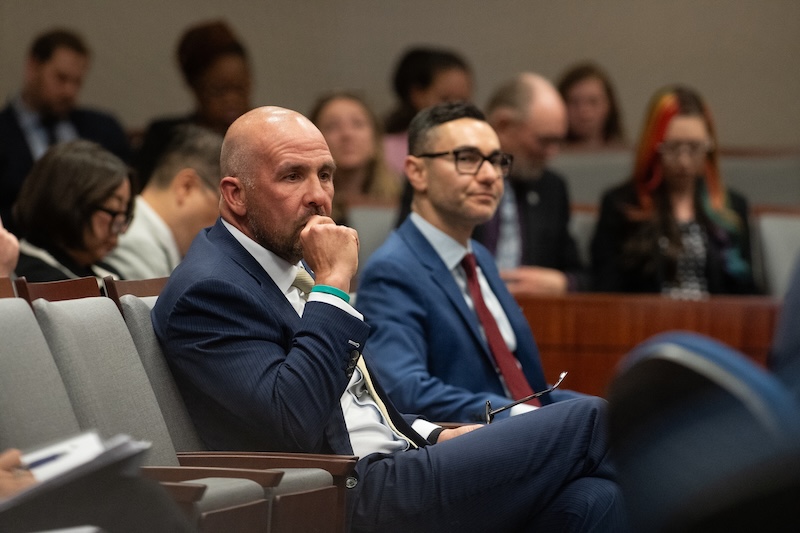With a Republican president enjoying majority support in both houses of Congress, and with a rival casino project hanging in the balance, Graton Rancheria has made a 180-degree turn. Here’s what the records show.
The largest tribal donor in American politics has reopened its checkbook in the aftermath of the November election. But the money flowing from the Federated Indians of Graton Rancheria is suddenly going to very different candidates and causes.
The tribe, which operates the Bay Area’s largest casino outside Rohnert Park, gave $5.85 million to federal candidates and political committees in 2023-24 — more than any other sovereign tribe — and just under $2 million to California races during the same time frame. Those contributions went almost exclusively to Democrats and liberal causes, making the tribe a powerful force in progressive politics and one of the top donors overall in California.
But with a Republican president enjoying majority support in both houses of Congress, and with a rival casino project hanging in the balance, Graton Rancheria has made a 180-degree turn.
According to data posted by the Federal Election Commission, the tribe donated $176,000 to political funds in February and March. Every dollar went to Republicans.
The largest chunk was a $100,000 gift to the National Republican Congressional Committee, which works to get members of that party elected to the U.S. House of Representatives. Other contributions included $5,000 to the Republican Governance Group, a political action committee, or PAC, that focuses on health care, energy, infrastructure and workforce issues; and $5,000 to the Heartland Values PAC, which is affiliated with Senate Majority Leader John Thune of South Dakota.
The National Republican Congressional Committee did not respond to a request for comment.
Graton Rancheria also donated $6,600 each to the campaign funds of 10 individual Republican officeholders. Half of them — Reps. David Valadao, Vince Fong, Darrell Issa, Doug LaMalfa and Jay Obernolte — are based in California. But the tribe also backed Reps. Tom Emmer of Minnesota, Bruce Westerman of Arkansas, Jeff Hurd of Colorado and Harriet Hageman of Wyoming, as well as Sen. Lisa Murkowski of Alaska.
The political spending records were available only through March.
“We give to causes we believe in regardless of political affiliation,” Graton Rancheria Chair Greg Sarris said in a brief written statement. “As the original residents of this land, we stand for environmental stewardship, social justice for all and sovereignty rights for tribes.”
Before this year, Graton’s commitment to environmental protection and social justice led the tribe to veer hard to the left. In the previous election cycle, it contributed $1.5 million to a PAC called Newsom’s Ballot Measure Committee, $200,000 to the Democratic Senatorial Campaign Committee and $200,000 to the Standing Strong PAC (affiliated with now-California Sen. Adam Schiff), among other gifts.
Most prominent was Graton Rancheria’s support of Californians for Choice, a PAC formed to help preserve and expand abortion rights; it later pivoted to organizing pro-choice voters in key California congressional districts.
The tribe largely bankrolled that PAC with $4 million in donations. Now it’s giving to staunchly anti-abortion politicians like Issa, LaMalfa, Valadao, Obernolte and Fong — each of whom received a grade of A+ from the organization Susan B. Anthony Pro-life America.
The Press Democrat was unable to reach representatives of Californians for Choice.
Sarris signaled his reevaluation of political affiliation in March, at a ceremony marking completion of a major construction phase at the Graton Resort and Casino.
“Let’s not kid ourselves, the Trump administration would like to flip back anything the Democrats did,” Sarris told The Press Democrat at the time. “Sure, they might be upset with us. But I think right now, when they see what was done to us, we’re a perfect example of one of the things they’ve always complained about the Democratic Party. And I will hold that up.”
Flipping economic-political allegiance is “a little bit unusual,” but not unheard of, according to Sonoma State University political science professor David McCuan.
“To do a 180 is smart politics. It may not be genuine interest,” McCuan argued. “You do it out of necessity because the conditions call for that. But if you know the rhetoric of Greg (Sarris), and his beliefs, and where the tribe is coming from, this money is about convenience and political timing — and that’s all.”





